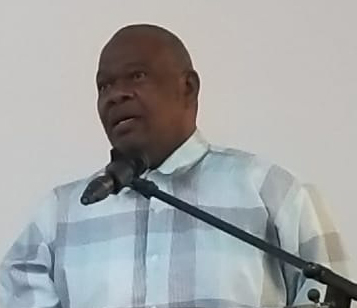There is a need for the deconstruction of negative representations of masculinity within classrooms, according to lecturer Dennis Gill.
Gill, who lectures at the University of Guyana’s Tain, Berbice campus, made the argument at the university’s Symposium on Boys’ Education last Friday, when he presented on the “Misconstructions, Deconstructions and Reconstructions in Masculinity: Implications for the curriculum of male students.” His presentation was centred on the works of writer Earl Lovelace and, as he put it, was an “interplay of masculinity formation, representation and the curriculum.”
“If we are dealing with masculinity and if we are dealing with representations of [masculinity], then we need to ask ourselves: Can we address the curriculum for boys without first addressing the question of what is masculinity? Since, essentially, what we are concerned with isn’t so much our boys knowing good Standard English, Literature, History, etc., but we are concerned about the persons they become. Holistic persons,” Gill told the audience at the Arthur Chung Convention Centre.
He noted that Lovelace’s writings point toward the fact that when it comes to the idea of “successful masculinity,” often focus is placed on dominance, economic prosperity, the “valorization of the phallus,” and the suppression of feelings/emotions.
“What Lovelace says in his writings… is the notion that those ideals or expectations of masculinity, rather than helping to heal, they’re triggers for the pain and displacement that our boys and our male subjects feel,” Gill related.
He posited that people are shaped and “bombarded” by the representations around them, be it from the home environment, the school environment, or even the culture industry, particularly when it comes to music.
“I’ve heard it said before and I concur… the classroom is no match for those representations,” Gill asserted.
“What we can do in the classroom is that we can equip our young men with the tools they need to deconstruct those representations. In other words—you find representations are negative, bring them before the youngsters, let’s have a discussion in the class. Let’s talk about it,” he advised.
He concluded then that in order for there to be a change in outcomes, there needs to be a shift in paradigm as it relates to the ideas of success, and that shift needs to occur within the training colleges, universities, and schools.
“I have interfaced the theorizings by two researchers in education—Paulo Freire and Carl Rogers, because I find the two applicable in the context of Lovelace’s discourse. Freire speaks to the notion of the culture of silence. He speaks to the notion of education either being for conformity or for freedom. And he questions the notion of our boxing, whether our students be female or male, into certain fixed expectations, which in fact may be imprisoning and limiting their minds, as against education being for liberation, where in fact, one may develop critical thinking skills, where they deconstruct, they carefully analyze those value systems, and they take it a stage further; they reconstruct, examine the environment in which they operate and even become advocates for change within the society,” he said. “I put it to us that sometimes the unruly youngsters in our classrooms may be saying to us [that] it’s about time we shut up and listen to them. I am saying that they may be saying to us that what you consider as success, what you consider as educating me, I cannot relate to,” he added.
He stated that teachers need to be aware of their roles as therapists, and recognize that masculinities are ideological. Gill opined that the feelings of anger, inferiority and “nothingness” sometimes felt by males are brought on by misrepresentations and misconceptions about what being a man is about.
He, therefore, advised that curriculums be reexamined so that systems of training are put in place to equip educators with the needed knowledge and awareness to deal with the issues, while acknowledging that work has already begun among varying organizations.
“I would like to say that there is a difference between a form of awareness where we make young men know and a form of awareness which makes our young men become. I think we should be striving to move from knowing [to] becoming,” Gill stated.
The system, he acknowledged, is a complex one. Gill noted that a holistic approach is needed to address the issues, and recommended that instead of all funding going toward research, that artists be brought on board to assist with finding creative ways to take the discussions to the communities.






